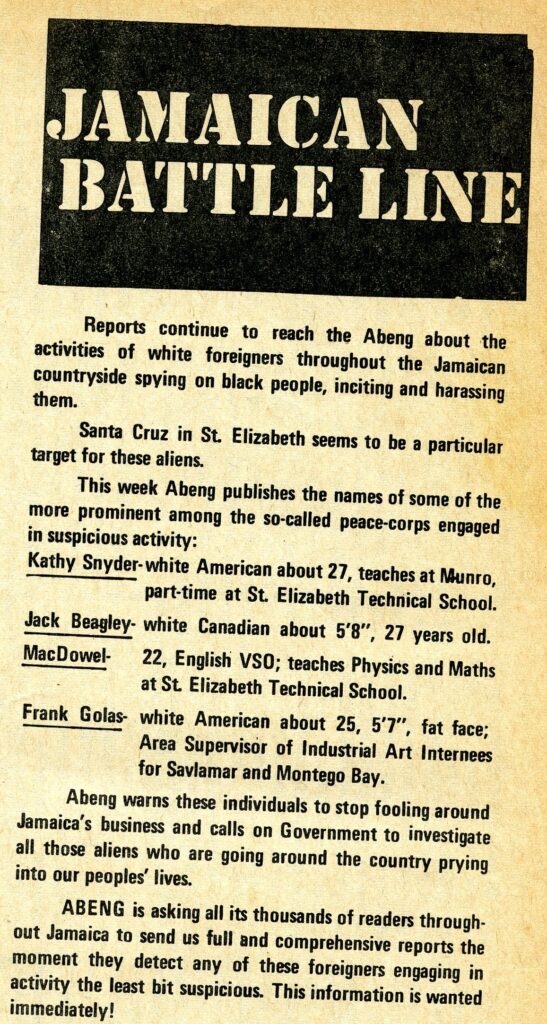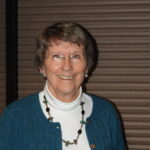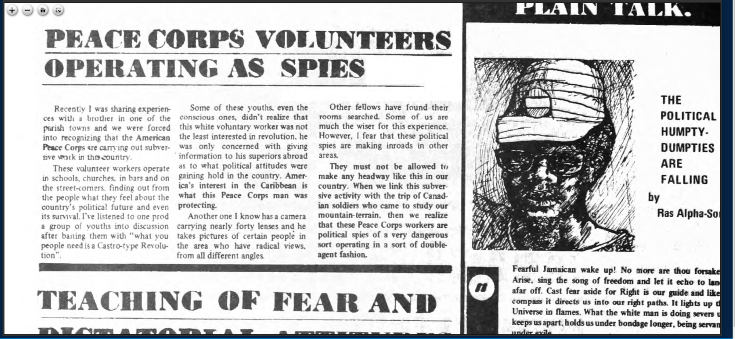PCVs accused of spying in Jamaica
ABENG
The Abeng was a horn used by Maroons to communicate between communities.
The Abeng, as I knew the term during the spring of 1969 while serving as a Peace Corps volunteer living in Santa Cruz, St. Elizabeth, was a Jamaican publication of about four pages published weekly that existed for only nine months of 1969 but was a major force in the development of Jamaican and Caribbean radical thought focused on Black Power.
Articles in the Abeng for April 26, May 3, and May 10, relate directly to my personal experience and that of three other volunteers representing The United States, Canada, and England. This article headlined JAMAICAN BATTLE LINE affected my life and the lives of the CUSO couple very directly. Fortunately, none of us was physically harmed. I do not have any information about what happened to the other two named.

Some Jamaicans tend to believe anything in print! Jack Beagley, listed in the article, and his wife Lesley, also a CUSO volunteer and teacher at STETHS, had an infant son and were allowed to have a car. Someone put sugar in the gas tank of their car! For their own safety they decided to leave Jamaica and return home to England (their homeland before moving to Canada) immediately. The Peace Corps director advised me to get out of Santa Cruz for a while and go stay with Jim McCallum, a PCV and my fiancé, in Westmoreland until things calmed down.
My name was misspelled, my age was wrong, and my Peace Corps sites were inaccurate. I was Cathie Schneider, age 26 in 1969, and served as Guidance Counselor to many schools and a college in St. Elizabeth parish.
Months later, while in Kingston for an event, a Jamaican acquaintance introduced me to the editor of the Abeng and asked him why he had accused me of spying. With a very polite smile, as I recall, he simply said that he published the news that was sent to him.
The complete run of Abeng is available online at the Digital Library of the Caribbean, through the University of the West Indies, St. Augustine campus. It had a short run from February 1969 and folding in November 1969 when a fire destroyed the place where it was printed.
This is an example of Peace Corps volunteers being identified in print as spies!


We have all experienced this in some form. In Kenya in the late sixties an older man accused me. I retorted asking what the CIA might want to know that was secret about Central Nyanza? He couldn’t think of anything, but suggested that if I did not report on him we could be friends. We parted on that basis.
I think it would be good to put the date of the publication in a prominent place so it does not appear to be a contemporary account.
When Kennedy was assassinated, my site partner and I were newly arrived in our site and we had not made a really adequate effort to introduce ourselves to all the town people. When the tragic news reached us, we did not show any fear for the safety of our family. There were people in our town who were very susicious of us and felt our lack of fear meant that we were somehow associated with those who had done the horrible deed.
The Padre rushed us out of town and told everyone that we were going to be with our our fellowVolunteers/ . A year later we learned that he had been afraid for our safety. We were gone for four days. When the papers came from Bogota, El Tiempo had the picture of Mrs Kennedy our in public on the steps of St. Matthew:s and John John saluting his father’s coffin. People in our town decided that if Mrs. Kennedy was not afraid for the safety of her children, that maybe our reaction was because we were really good Americans.
Somewhere I read that even Fidel Castro considered PC volunteers just that- volunteers, not spies. Even so, people in other countries also watch television and read newspapers. Just before I joined, Congress held the Church Hearings in public and the testimonies were like listening to family secrets for the first time. So, when I was accused of being a spy in the House of Love, my reaction was just to shrug my shoulders.
However, I know of at least one former volunteer who warned me that once his five years was up, he might disappear. That would be the sign that he had become a covert agent. He did disappear.
We all have acquaintances who had long careers with the federal government after service. Sometimes, these jobs are used as a cover. Check the Church Committee Hearings findings (circa 1974).
There was one RPCV who flunked CIA training and “defected”. Here is the link: https://peacecorpsworldwide.org/who-was-5/
I was a PC volunteer in Jamaica from 1974-1977 working in Agriculture in Manchester . At that time, Cuba had aligned with Jamaica in a Communist/Socialist agenda and the society in the cities was agitated. I went into Kingston to see my good friend who was an Oceanographer/ Engineer, He was giving a presentation to a group concerning Coastal erosion and beach destruction and I went to listen. There were a number of Newspaper columnists there as well, and one of them published an article that evening that a Peace Corps Volunteer was helping the CIA engineer a coastal invasion by the US Naval 7th Fleet. Definitely a bunch of lies, but enough to have two Police Officers come to my friends flat and arrest both of us. The Policemen were nice fellows and told us they had orders. We called the US Embassy and PC Director. They both came down to the precinct and got us released. I distinctly remember the Embassy fellow say to my friend;” You, go home and pack your things, you’re flying home tonight”! To me, he said’ Who are you again?” I told him who I was and where I lived and he said; “OK, You get on a transport and get out of Kingston and go home now”. You’ll be OK out in the country, just don’t come back to Kingston for awhile”.. Everything calmed down for me after that back in Mile Gully. No one else cared what was going on in Kingston…